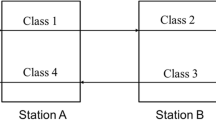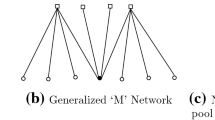Abstract
We investigate, under general stationary e‘rgodic assumptions, the stability of systems of S parallel queues in which any incoming customer joins the queue of the server having the p + 1-th shortest workload (p < S), or a free server if any. This change in the allocation policy makes the analysis much more challenging with respect to the classical FCFS model with S servers, as it leads to the non-monotonicity of the underlying stochastic recursion. We provide sufficient conditions for the existence of a stationary workload, which indicate a “splitting” of the system in heavy traffic, into a loss system of p servers (that is, a system with p servers and no waiting room), plus a FCFS system of S − p servers. To prove this result, we show en route an original sufficient condition for the existence and uniqueness of a stationary workload for a multiple-server loss system.
Similar content being viewed by others
References
Baccelli F, Brémaud P (2002) Elements of Queueing Theory, 2nd ed. Springer
Borovkov AA (1984) Asymptotic Methods in Queueing Theory. J. Wiley, New york
Borovkov AA, Foss S (1992) Stochastic Recursive Sequences and their Generalizations. Siberian Adv Math 2(1):16–81
Brandt A (1985a) On stationary waiting times and limiting behavior of queues with many servers I: The general G/G/m/ ∞ case. Elektron Inform U Kybernet 21:47–64
Brandt A (1985b) On stationary waiting times and limiting behaviour of queues with many servers II. The G/GI/m/8 case. Elektron Inform Kybernet 21:151–162
Brandt A, Franken P, Lisek B (1990) Stationary Stochastic Models. Akademie-Verlag/Wiley
Chang CS (1985) A new ordering for stochastic majorization: Theory and applications. Adv Appl Probab 24:604–634
Decreusefond L, Moyal P (2012) Stochastic Modeling and Analysis of Telecom Networks. ISTE Wiley
Flipo D (1983) Steady State of Loss Systems. Comptes rendus de l’Acadmie des Sciences de Paris. Ser I 297(6)
Flipo D (1989) Charge stationnaire d’une file d’attente à rejet. Cas de plusieurs serveurs. Annales scientifiques de l’universit de Clermont-Ferrand 2, vol 93
Foss S (1981) Comparison of service disciplines in multichannel service systems. Siberian Math Zh 22(1):190–197
Foss S (1989) Comparison of Service Disciplines in G/GI/m Queues. INRIA Research Report:1097
Foss S, Chernova N (2001) On optimality of the FCFS discipline in multiserver queueing systems and networks. Siberian Math Zh 42(2):372–385
Kiefer J, Wolfowitz J On the theory of queues with many servers. Trans Amer Math Soc 78:1–18
Koole G (1991) On the Optimality of FCFS for networks of multi-server queues. Technical Report BS-R9235, CWI Amsterdam
Koole G (1996) On the pathwise optimal Bernoulli routing policy for homogeneous parallel servers. Math Oper Research 21:469–476
Koole G (2005) Routing to parallel homogeneous queues. Presented at the Lorentz Center workshop in honor of Arie Hordijk
Koole G, Sparaggis PD, Towsley D (1999) Minimizing response times and queue lengths in systems of parallel queues. J Appl Prob 36:1185–1193
Liu Z, Towsley D (1994) Optimality of the round-robin routing policy. J Appl Prob 31:466–475
Lisek B (1982) A method for Solving a Class of Recursive Stochastic Equation. Zeitschrift fr Wahrsch 60:151–162
Loynes RM (1962) The stability of queues with non-independent interarrivals and service times. Proc Camb Philol Soc 58:497–520
Mitzenmacher M (2001) The power of two choices in randomized load balancing. IEEE Trans Parall Distrib Syst 12(10):1094–1104
Moyal P (2010) The queue with impatience: construction of the stationary workload under FIFO. J Appl Probab 47(4):498–512
Moyal P A pathwise comparison of parallel queues. arXiv:1301.6364
Moyal P (2015) A generalized backwards scheme for solving non monotonic stochastic recursions. Annals Appl Probab 25(2):582–599
Neveu J (1983) Construction de files d’attente stationnaires (in French). Lecture Notes in Control and Information Sciences, vol 60. Springer-Verlag, pp 31–41
Reiman M (1983) Some diffusion approximations with state-space collapse. Lecture Notes in Control and Information Sciences, vol 60. Srpinger-Verlag, pp 207–240
Scheller-Wolf A (2003) Necessary and sufficient conditions for delay moments in FIFO multiserver queues with and application comparing s slow servers with one fast one. Oper Res 51(5):748–758
Whitt W (1986) Deciding which queue to join: Some counterexamples. Oper Res 34(1):55–62
Author information
Authors and Affiliations
Corresponding author
Rights and permissions
About this article
Cite this article
Moyal, P. On the stability of a class of non-monotonic systems of parallel queues. Discrete Event Dyn Syst 27, 85–107 (2017). https://doi.org/10.1007/s10626-016-0230-9
Received:
Accepted:
Published:
Issue Date:
DOI: https://doi.org/10.1007/s10626-016-0230-9




